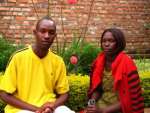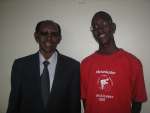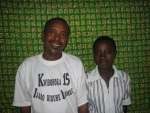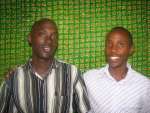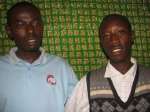Mukayiranga Verena & Mugisha Gabriel & Sharangabo Jean de Dieu
Mukayiranga Verena is speaking with two of her adopted sons, Mugisha Gabriel and Sharangabo Jean de Dieu. She tells stories of her struggles with discrimination between the different ethnicities and how there was nothing but love between all Rwandese people before the colonists arrived. Verena shares how she lived in paralyzing fear during the war saying “I could not sleep well; I would think that people would come to kill us.” Despite being traumatized by her experiences she overcame her fear and shares her story with her sons.
Umazikungu Beatrice & Gashumba Yves Fabrice
Although Gashumba Yves Fabrice and longs for a peaceful future, he still has a hard time forgiving those involved in the genocide and fears the resurgence of conflict. His friend Umazikungu Beatrice reminds him that kindness toward everyone is the best way to prove that Rwanda can move forward, and it is better to be remembered for acts of kindness rather than the brief satisfaction of taking revenge and being remembered for evil.
Kaberuka Anatole & Mulima Ngautabana Yves
It is well known in Rwanda that ethnic tribes coexisted peacefully before the genocide. Kaberuka Anatole explains to his grandson Mulima Nyautabana Yves about how the colonial regime worked to turn tribes against one another, cultivating hatred and jealousy in order to maintain control and exploit Rwanda. In a history tale that begins before Belgian rule, Kaberuka Anatole shows how the colonial regime treated the country like playing a game of cards.
Uwayezu Dieu Domme & Gota Issa
Gota Issa asks his father, Uwayezu Dieu Domme, to explain the difference between how Rwandese lived in the past and how they live today. Uwayezu Dieu Domme takes this opportunity to describe how life was in Rwanda before ethnicities were brought by the white people. This was a time when Rwandese respected and helped each other, regardless of their background. Uwayezu Dieu Domme hopes that the Rwandese today can learn from the culture of their ancestors and start to respect each other once again. He notes that “the most important battle is to know history.”
Tabaruka Jeannine & Unnultoza Christine
Tabaruka Jeannine and Unnultoza Christine discuss the reason that Unnultoza Christine grew up without her father and brother. Unnultoza Christine has several questions surrounding their deaths during the genocide. Tabaruka Jeannine does her best to answer these questions so that her daughter may understand her family's history, but more importantly so she can move past the harsh realities of Rwanda's past and begin planning her future. Tabaruka Jeannine relates her past to help Unnultoza Christine realize that she is not alone in her struggles and that they are surmountable.
Mukansanze Imfura Chantal & Turatsinze Jimmy
Mukansanze Imfura Chantal explains to Turatsinze Jimmy how he became an orphan and how he got to where he is today. She urges him to continue his education and, equally importantly, to treat everyone as equals, regardless of ethnicity, wealth, or status, not only for himself, but for the future of the country. Turatsinze Jimmy describes his hazy memories as a young boy about the origins of genocide—why did a plane crash start a war? Was there already a plan in place to start the killing? Has there always been a rift between ethnicities?
Sakindi Jean Marie Vianney & Sakindi Uwera Marie Rose
Sakindi Jean Marie Vianney and his daughter Sakindi Uwera Marie Rose use this opportunity to discuss the origins and causes of the 1994 genocide on both personal and national levels. Sakindi Jean Marie describes to Sakindi Uwera Marie Rose how close he and his wife came to death and what life was like in the years leading up to the genocide. They hid in closets, relied on the kindness of their neighbors, and turned to faith to keep them hopeful and lead them to forgiveness. Sakindi Uwera Marie Rose details how she and her classmates try to prevent conflict in their country.
Niyiguba Emmanuel & Rugira Jean Rene
Older brother Niyiguba Emmanuel explains in great detail the genocide that resulted in the brothers' loss of several siblings and one parent. Rugira Jean Rene recounts to his brother the details of the genocide and ethnic discrimination that he is familiar with and Niyiguba Emmanuel elaborates on these facts with more details and additional information, helping his younger brother to understand his country's and family's history better.
Mwumvaneza Vincent & Tambo Nelson
Tambo Nelson and his older brother Mwumvaneza Vincent discuss the colonial origins of the ethnic divide between Hutu and Tutsi. Mwumvaneza Vincent explains how, prior to colonialism, Rwanda was divided by wealth and status, not ethnicity, but the presence of colonial settlers and their institutions codified these differences and lead to ethnically divided political parties. Mwumvaneza Vincent wants Tambo Nelson to understand how violence and "genocide ideology" became present in Rwanda as a result of ethnic discrimination in education, work opportunities, and political rights.
Muhizi Jean Claude & Masengesho Jean de Dieu
Muhizi Jean Claude wants to inspire his friend Masengesho Jean de Dieu to be hopeful about the future by reflecting on how much has changed since his youth. Muhizi Jean Claude talks about how the segregation that existed in schools and how political instability contributed to the genocide. In answer to Masengesho Jean de Dieu’s question about ways for people to heal their emotional pain, Muhizi Jean Claude emphasizes youth breaking the cycle of ethnic discrimination.



